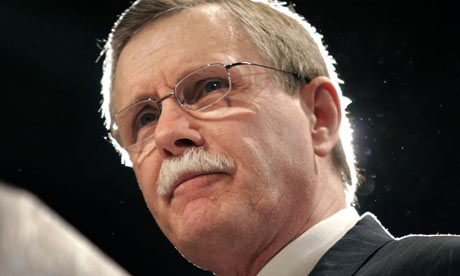Ron Gettelfinger: the man who conquered Detroit
After a catastrophic year for US carmakers, the head of the United Auto Workers union has emerged as one of the most powerful men in the industry
Deep in conversation on the floor of Detroit's cavernous Cobo convention hall, the General Motors (GM) chairman Ed Whitacre last week swapped views on electric vehicles with the speaker of the US House of Representatives, Nancy Pelosi, in front of a prototype of the Chevrolet Volt. In a huddle with the pair at the annual Detroit motor show, was a trim, bespectacled figure with a carefully cropped grey moustache.
Ron Gettelfinger, president of the United Auto Workers (UAW) union, is well and truly in the loop at the top of the US motor industry. A former chassis line repairman at a Ford factory in Indiana, the 65-year-old has led America's blue-collar automotive employees for eight years and has emerged from a catastrophic economic year as one of the most powerful men in Detroit.

A teetotaller, Ron Gettelfinger, head of the UAW, is known as 'the chaplain'. Photograph: Bill Pugliano/Getty Images
"People need to hang in there, to be optimistic," Gettelfinger told the Guardian, speaking on the fringes of the Detroit show. "I truly believe, after what we went through in 2008 and 2009, that the worst is over. I feel good about where we are today."
The scale of the devastation afflicting the US car industry is evident at the UAW. In 1979, the union represented 460,000 workers at GM. By the end of this year, that figure is likely to be 42,000.
"Every job we save is an important job – that's what we're all about," said Gettelfinger, who makes no apology for making concessions in employment, wages, healthcare and pension benefits. "If these companies had gone out of business – if GM had collapsed, they would have brought down Chrysler with them. They'd have brought Ford down too and they'd have hurt every foreign nameplate."
A traditionalist who still greets members as "brother" or "sister", Gettelfinger is one of 12 siblings from a small midwestern farming town. A shop steward since the 1970s, he is fluent in union-speak – he dismissed private equity firms as "flip and strip" merchants until one such company, Cerberus, bought Chrysler. Addressing the National Association for the Advancement of Colored People three years ago, he ended his speech by thundering: "Solidarity! Solidarity! Solidarity for ever!"
Under pressure
At the heart of reforming the finances of Detroit's carmakers were ground-breaking deals struck in 2007 in which the union took the burden for pensioners' healthcare coverage off the books of GM and Chrysler, through the creation of trusts known as VEBAs (voluntary employees' beneficiary associations). Overseen and administered by the UAW, these trusts ended up with large equity stakes in the two carmakers when they declared bankruptcy last year and were unable to stump up agreed contributions.
In an arrangement criticised by one labour expert as a "festival of conflicts of interest", that means that the UAW now negotiates with companies in which it holds a substantial ownership stake. Gettelfinger says the union's shareholdings are overseen by an independent body – but he admits there are "a couple of advantages".
"We've never had anyone on the boards before. We now have people on the boards at both Chrysler and GM. That can give us some inside knowledge," he says.
Not everybody is enamoured with this arrangement. Jonathan Cutler, author of a book about the UAW called Labor's Time, says it heightens workers' dependence on their employers: "You're an employee of a company and your union's investment portfolio is also tied to that company. That moves everything in the direction of financial dependence on one company. A union utterly dependent in that way is not in a position to exercise its power."
As recently as 2007, the UAW brought both Chrysler and GM to a halt, calling members out on strike as pay negotiations stalled. Although quickly resolved, the stoppages had near-unanimous support from 49,000 Chrysler workers and 73,000 at GM and indicated the loyalty still commanded by the union.
Two-tier system
But Richard Block, a professor of industrial relations at Michigan State University, says Gettelfinger has generally secured decent packages for victims of Detroit's cutbacks: "He's done a very good job in some of the most trying times a union has ever experienced."
Gettelfinger himself says the union has tried to act "responsibly" throughout the industry turmoil and rejects any notion of blame, although he pauses over a relatively militant wave of stoppages back in the 1990s, including a landmark strike at a GM factory in Flint, Michigan: "Have we made a decision over the years we shouldn't have? Some people might want to go back to Flint and talk about the strike there in 1995. But we can prove that, over the years, we've been responsible."
He says Detroit's problems should serve as a wake-up to America about the importance of industry.

No comments:
Post a Comment